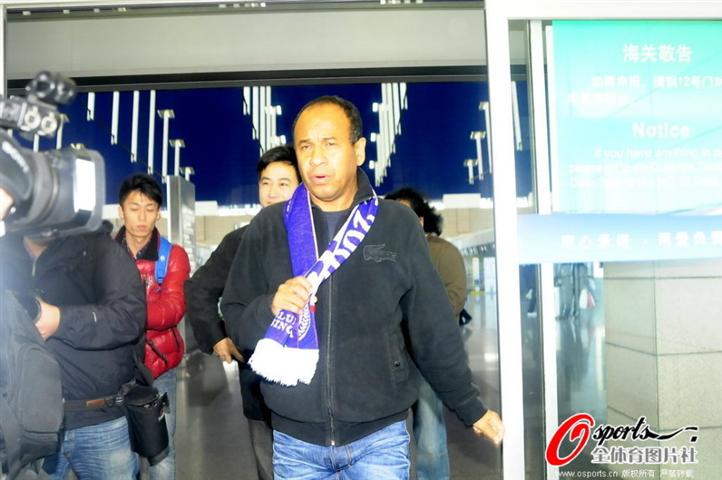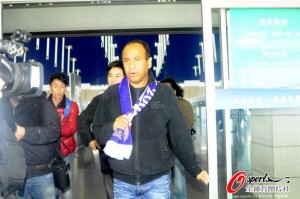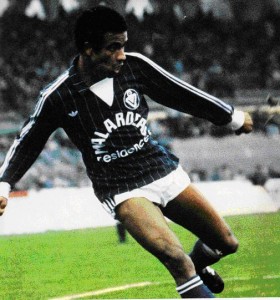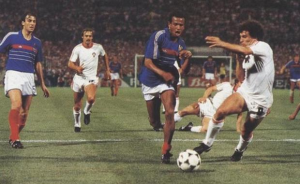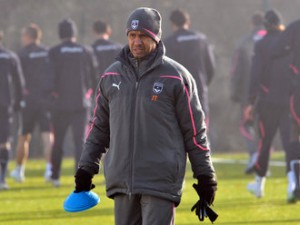Jean Tigana is expected to be unveiled as Shanghai Shenhua’s new head coach today, according a statement on the club’s official website. Joining for a reputed salary of around $3.2 million a year, the former Fulham boss becomes one of the highest profile figures ever to occupy the Hongkou hotseat, joining Miroslav Blažević and Howard Wilkinson on the list of big names who have managed Shenhua. ‘s Andrew Crawford takes a look at the man himself, his background, rise to fame, managerial career to date, and what he is getting himself into in Shanghai.
Jean Tigana was born in Bamoko, Mali, in 1955, before emigrating to France in his youth. He was famously working in a spaghetti factory when he was offered his first contract by Toulon in 1975. The diminutive 5″6 player spent three years at the second division club before catching the eye of future World Cup winning manager, Aime Jacquet, then managing Lyon. Tigana would eventually move to OL in 1978 after his Toulon contract expired.
Under Jacquet, Tigana would start to emerge as an all-action central midfielder and was crucial to keeping Lyon, then a relatively weak side in Ligue 1, away from the relegation places during that period. Tigana would also earn the first of many international caps for his adopted country in 1980.
However, it was when Tigana moved to Bordeaux in 1981 for £2M that the things really started to get interesting as he anchored the Les Girondins midfield during the club’s unprecedented period of success that included three French league titles and three cup victories.
Tigana was also a part of a dominant French midfield quartet of the 1980’s, that also included Michel Platini, Alain Giresse and Luis Fernandez (who was co-incidentally Anelka’s old boss from his second stint at PSG). Michel Hidalgo’s team would go onto be beaten semi-finalists in the 1982 and 1986 World Cups, but did win the Euro 1984 tournament staged in France itself.
Tigana would then move to Marseille in the summer of 1989, where he would win a further two Ligue 1 titles and be part of the side that lost to Red Star Belgarde in the 1991 European Cup final.
Two years later, the recently retired Tigana’s first foray into management came in 1993, when he replaced the outgoing manager, Raymond Domenech, who had moved on to coach the French under-21 team. Tigana knew exactly where to look for new blood and signed three of the core players from his old Marseille side; goalkeeper, Pascal Olmeta, Ghanaian legend, Abedi Pele and Manuel Amoros, another member of the great French squad of the 1980’s. Within two years, Lyon had gone from dark horses under Domenech to title contenders, finishing second in Ligue 1 behind champions, Nantes in 1995.

A couple of months later, Tigana moved to the south of France to coach AS Monaco, who had implausibly decided to release their previously successful manager, Arsene Wenger only weeks after refusing a request from Bayern Munich to talk to the future Arsenal manager. A four year spell, helped at the beginning by the emerging talents of Thierry Henry and Emmanuel Petit, saw Tigana win another league title in 1997 and famously beat Manchester United in the 1997/98 Champions League knock-out stages before losing to Juventus in the semi-finals.
Having resigned midway through the 1998/99 Ligue 1 season, the Frenchman then moved to Fulham in 2000, and via the money of Mohammed Al-Fayed and the goals of Louis Saha, guided the Cottagers to promotion to the Premiership in his first full season. With the addition of Lyon’s Steed Malbranque in midfield and Arsenal’s Luis Boa Morte to play alongside Saha, Fulham finished in 13th place in the 2001/2002 Premier League. However expensive flops like Steve Marlet and an ongoing relegation dog fight meant that Tigana was sacked with five game left of the following season.
In 2004, he, was considered for the vacant role as France manager along with Raymond Blance before the job was given to Domenech, who was still managing the under-21 side over a decade on from giving helping Tigana his first management job in football.
A year later, he resurfaced at Turkish club, Besiktas, winning a Turkish Cup before resigning once again with a couple of games left in the 2007/08 Turkish Super Lig season.
Most recently, Tigana was managing Bordeaux, another of his previous clubs, after Blanc got his chance to manage his country after France’s disastrous 2010 World Cup campaign. An unsuccessful season was difficult for the supporters, especially after they had won the league in 2008/09 under Blanc. After a 4-0 home defeat to Sochaux, the Bordeaux fans turned on their former player. Tigana, angry at the verbal abuse given to his teenage daughter, who was watching the game from the stands, resigned after the game.
Now in Shanghai, Tigana is very much his own man but for his eccentricities, he arrives having won a league title and two cups during almost two decades in football management. However, he is also a volatile manager and has demonstrated his willingness to walk out if things aren’t how he thinks they should be. Like his fellow Frenchman, Anelka, how the new man on the sidelines deals with his new surroundings will make for interesting viewing.
